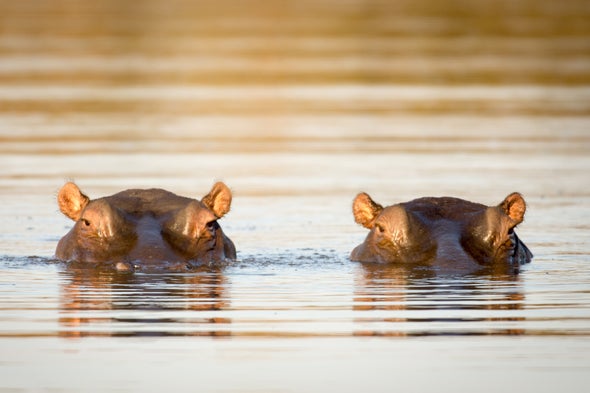(单词翻译:单击)
听力文本
This is Scientific American's 60-second Science. I'm Jason Goldman.
Around 115 miles east of Medellín, in Colombia, sits the enormous hacienda built by the drug lord Pablo Escobar—who had his own personal zoo, which included hippos. When Escobar's empire fell, most of the exotic animals were safely relocated—except for the hippos, who eventually escaped.
"So he brought four from a zoo in the U.S. to Colombia, and they lived at his ranch. And they've grown slowly but steadily."
Jonathan Shurin, ecologist from the University of California in San Diego.
The original population of four in 1981 is estimated to be at least 80 now. Hippos have a tremendous influence on their native ecosystems in Africa, so Shurin wanted to see how they might be affecting their new ecosystem in Colombia.
"It shouldn't be a surprise to anybody that hippos poop in the water in South America, just as they do in Africa."
Hippos on both continents wallow in ponds and lakes, where their droppings release a tremendous amount of nutrients into the water.
"That imported material stimulates photosynthesis of algae and aquatic plants and also microbial bacterial production—bacteria that are living off of the organic matter that's imported."

And that's where the hippos can cause ecological trouble. If there is too much photosynthesis occurring, then the water becomes full of oxygen during the daytime. But at night, when the sun goes down, and the plants and algae stop releasing oxygen into the water, a phenomenon called eutrophication occurs. All the creatures that consume oxygen keep consuming it, and the overall amount of oxygen dissolved in the water becomes critically low.
"The oxygen dropping low enough—you can have all the fish sort of croaking and going belly-up."
The researchers also say the situation provides a unique glimpse into the way that massive mammals like mammoths and mastodons, long extinct in the New World, may have influenced their habitats prior to their extinction.
But they also note that unless we can somehow curtail their population growth, the hippo population could explode in the next couple of decades—at which point, they will disrupt larger and wilder river systems. The study is in the journal Ecology.
Lethal control isn't a popular management strategy among people who love hippos or see them as a valuable tourism attraction. But the question is when, not if, the hippos become detrimental to Colombian ecology—which means that folks should be thinking about the best way to solve the problem now, when there are fewer than a hundred hippos to manage and not thousands.
Thanks for listening for Scientific American's 60-second Science. I'm Jason Goldman.
参考译文
这里是科学美国人——60秒科学。我是杰森·古德曼。
哥伦比亚麦德林以东115英里处,坐落着毒枭帕布罗·埃斯科巴建造的巨型庄园,拥有私人动物园,园中的动物包括河马。埃斯科巴帝国衰落后,大多数海外动物都被安全迁移,但最终逃跑的河马除外。
“他从美国动物园买了四只河马运到哥伦比亚,养在他的庄园里。这些河马缓慢但稳定地生长。”
加州大学圣地亚哥分校的生态学家乔纳森·舒林说到。
据估计,1981年原种群的4只河马如今至少繁殖为80只。河马对非洲原生态系统有着巨大的影响,因此舒林想了解它们可能对哥伦比亚新生态系统产生的影响。
“和在非洲一样,河马在南美洲也在水中排便,这对任何人来说都不应该感到惊讶。”
两大洲的河马都在池塘和湖中打滚,它们的粪便会向水中释放大量养分。
“进口物质会刺激藻类和水生植物的光合作用,也会刺激微生物细菌的产生,这些细菌靠进口有机物为生。”
这就是河马可能导致生态问题的地方。如果产生太多光合作用,那白天水中就会充满氧气。但到了晚上,太阳下山,植物和藻类停止向水中释放氧气时,就会发生一种名为“富营养化”的现象。消耗氧气的所有生物会继续消耗氧气,而水中溶氧总量会急剧减少。
“水中氧气下降到足够低时,可能会让所有鱼都会因缺氧而死亡。”
研究人员还表示,这种情况提供了独特的视角,让我们得以了解猛犸象和乳齿象等早已在美洲大陆灭绝的大型哺乳动物,在灭绝之前影响栖息地的方式。
但他们也注意到,除非我们能以某种方式加以控制,否则河马数量可能在未来几十年内呈现爆炸式增长,届时,它们会破坏更大、更野生的河系。这项研究发表在《生态学》期刊上。
喜欢河马或将其视为珍贵旅游资源的人,并不欢迎致命控制这种管理策略。但问题是,河马何时——而非是否——会对哥伦比亚的生态环境造成危害,也就是说,人们现在应该考虑解决问题的最佳方法,因为现在河马数量少于一百只,而不是几千只。
谢谢大家收听科学美国人——60秒科学。我是杰森·古德曼。
译文为可可英语翻译,未经授权请勿转载!
重点讲解
重点讲解:
1. except for 除了;除…之外;唯有;
The bus was empty except for one young lady.
公共汽车上很空,只有一位年轻的女士。
2. live off 依赖(某人)生活;
He seems to live off junk food.
他好像靠吃垃圾食品为生。
3. go down (太阳)落下;
The shadows lengthened as the sun went down.
随着太阳西下,影子越拉越长。
4. prior to 在…之前;先于;
It is important to enrich the soil prior to planting.
在种植前给土壤增肥很重要。


